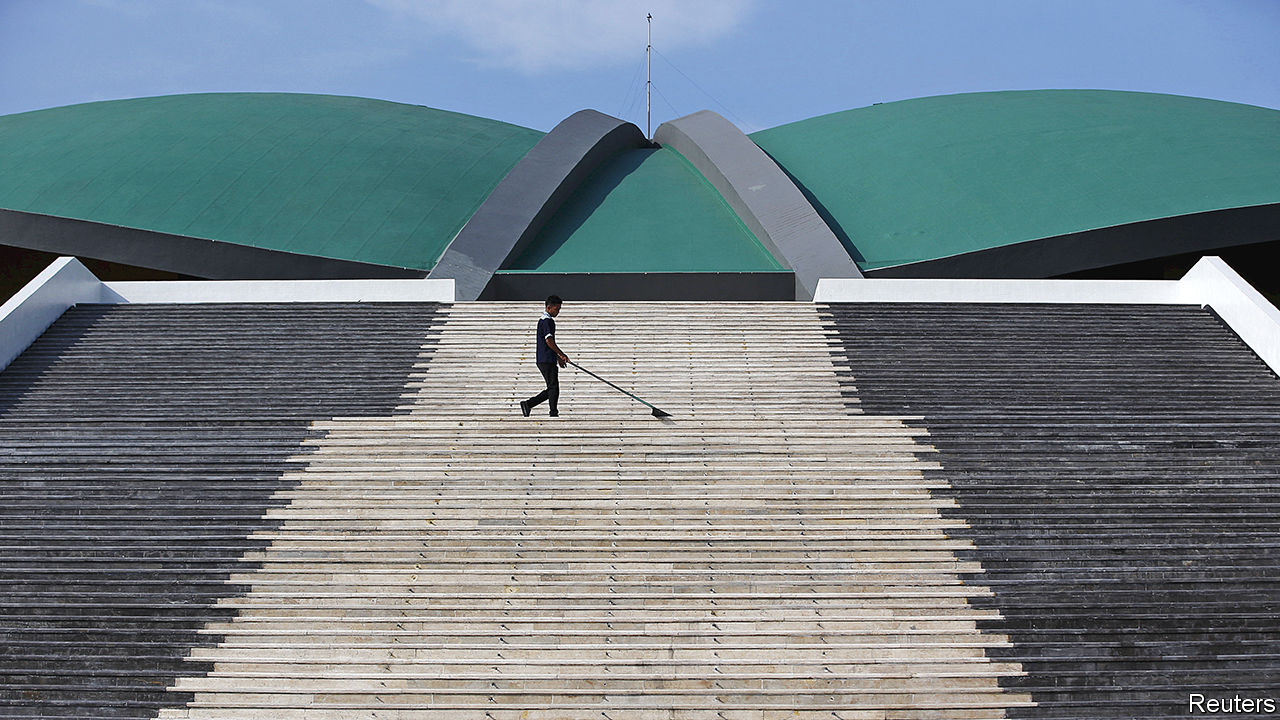| JAKARTA
Corruption and a lack of expertise are partly to blame

THIS May, to mark the start of Ramadan, Sharp Indonesia, an offshoot of a Japanese electronics giant, launched the world’s first halal fridge. Not a fridge for halal food; an appliance that is itself supposedly sharia-compliant (though the Koran does not mention fridges). At a press conference the firm’s executives donned batik shirts and huddled around it, giving a cheery thumbs-up.
The stunt was primarily a marketing exercise, but soon Indonesian shoppers will be able to snap up many more improbable, halal-certified goods. For that they can thank a vaguely worded law which comes into effect in October next year. It stipulates that most products must be halal-certified, without precisely defining which products it means. Lawyers argue that it could apply to inedible goods, such as fridges, and even to services like consulting.
That is by no means Indonesia’s only woolly law. Under an open-ended one against defamation, creators of internet memes have been arrested for embarrassing politicians. An anti-pornography law allows officials to prosecute people who perform “actions deemed indecent” in public. A counter-terrorism statute, passed in May, is equally imprecise. Even those who harm the environment can be cast as terrorists. Such broad-brush rules could easily be turned on political protesters, points out Andreas Harsono of Human Rights Watch, a pressure group.
Other regulations, enacted to strengthen the economy, are simply ill-thought- through. In an attempt to capture more value from Indonesia’s abundant minerals, the government in 2014 banned exports of unprocessed ore. But instead of building refineries and smelters, many mining firms simply shut up shop. By 2015 the production of nickel, a big export, had dropped by 60% from its peak. A similar edict said that only Indonesian ships could export coal and palm oil and import rice, though the wording was characteristically vague. That was shelved in June, following protests from industry.
Lawmakers are also unproductive. Last year parliament set itself a target of approving 52 bills, but in the end passed only six—a figure which is not unusually low. That irks voters. “They do nothing; they just talk,” laments Pochaki, a manager in Jakarta. That means that draft laws typically take an agonisingly long time to be enacted. Take the new criminal code, which may at last become law in the next few months. The one now in force, adapted from a Dutch colonial precursor written in 1918, has not been revised since 1981. Talk of an update started in the 1980s, with the first of many drafts appearing in 1993.
Why is Indonesia so bad at lawmaking? One reason is a lack of expertise. It has been a democracy for only 20 years. Before that, the government, rather than the legislature, drew up most laws. Whereas in many other countries legal boffins do the drafting, in Indonesia the job can fall to politicians, many of whom are inexperienced. After the most recent election in 2014, well over half the members of parliament were new to the job.
Another concern is graft. Polls routinely find that the national parliament is considered the country’s most corrupt institution. A graft-busting commission has found grounds to arrest MPs from all ten of the parties represented in it.
Yet another factor is Indonesia’s political culture. Consensus is prized, and governments generally include a motley array of parties. There is very little party discipline. Instead, as bills are thrashed out in committee, everyone weighs in, including various government departments, which are often at loggerheads. The counter-terrorism bill was held up for months because of a dispute between the police and the army, for instance.
The problem is compounded by regional legislation. Provinces and regencies (roughly equivalent to counties) have the power to produce their own laws. This creates a “jungle” of often-contradictory regulation, says Simon Butt, a professor of Indonesian law at Sydney University. When local laws conflict with regulations issued by the central government, it is not clear which have precedence. Some functions of government, such as granting logging permits, end up being done at both levels, creating confusion.
In 2016 the home-affairs ministry tried to simplify the legal system by voiding 3,000 local regulations, only to be reversed by the constitutional court last year. Its decision has emboldened provincial governors and regents and adds to the importance of regional elections to be held on June 27th. However, such polls are usually won on personality and local issues, rather than lawmaking ability. Indonesia’s legal jungle will not be cut down soon.
This article appeared in the Asia section of the print edition under the headline "Poor laws"